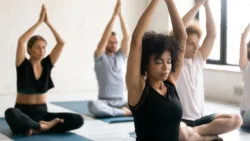
Yoga is an ancient form of meditation that is made up of many different physicals, mental and spiritual practices. It is a popular form of exercise and revered for its facilitation of clear-mindedness, body awareness and relaxation. Yoga is strongly rooted in the philosophy that, in part, recognizes the importance of connecting, honoring and nurturing oneself.
Trauma is the psychological byproduct of experiencing stressful, harmful or distressing events. Psychological trauma can have physiological effects, such as aches and pains, tense muscles, headaches, dysregulation of emotions and anxiety. These side effects can be triggered when the individual is in an unrelated stressful situation, an environment that reminds them of their traumatic event, and even for no reason at all.
Trauma-sensitive yoga examines the effects of trauma on the body and engages yoga practices to address and overcome those impacts.
What is trauma-sensitive yoga?
Trauma-sensitive yoga is a type of yoga that is specifically designed to help practitioners work through and heal from their trauma. Its foundation is in hatha yoga, one of the most popular types of yoga in the western world that focuses on physical and mental strength-building through breathwork (prāṇāyāma), poses (asanas), hand gestures (mudras) and meditation. It is not meant to function similarly to talk therapy where the client relives and discusses their trauma; rather, trauma-sensitive yoga is a complementary treatment in that it prepares the body for trauma confrontation in psychotherapy while building self-confidence, self-awareness and personal growth.
How does trauma-sensitive yoga work?
People who are carrying trauma are not able to escape this trauma; it is quite literally within them. As such, the setting in which trauma-sensitive yoga is practiced must take care to make practitioners feel comfortable in their class and in their own bodies. Trauma also increases stress responses, distresses the nervous system and can trigger feelings of “fight or flight,” so trauma-sensitive yoga must be able to address these unpredictable effects in a gentle way.
There are five key areas in which trauma-sensitive yoga places more of an emphasis than other forms of yoga:
- Environment: Creating a safe, welcoming and non-judgemental space that allows practitioners to feel comfortable in their vulnerability.
- Physical exercise: Designing low-intensity sequences that are beneficial for both the body and mind.
- Assistance: Assisting practitioners through words and demonstration rather than being hands-on.
- Teacher qualities: Being gentle, uplifting, patient and non-authoritative.
- Language: Speaking softly, carefully, intentionally and compassionately, even during corrections.
Your exact flow will vary from class to class as well as your goals, but these are some poses you may hold in trauma-sensitive yoga that will help you heal and release:
- Cat-cow pose (Marjaryasana-bitilasana) is a stretching sequence that is thought to promote self-love and emotional and physical balance.
- Child’s pose (Bālāsana) is a nourishing and restful pose that allows you to sink into your own body and take a quiet moment.
- Upward-facing dog (Urdhva Mukha Svanasana) will open your chest and will help you feel like you are releasing energy.
- Frog pose (Mandukasana) is a deep pose that opens the hips and can release tension carried in the pelvis.
- Corpse pose (Shavasana) is often the final pose in a yoga practice and is meant to promote bliss, reflection and calm.
- Semi-supine pose or constructive rest pose can help you feel grounded and supported.
- Yoni mudra (Womb Gesture) is thought to balance the body and calm the nervous system.
- Hridaya Mudra (Heart Gesture) is thought to nourish the heart.
- Shuni Mudra (Seal of Patience) is thought to provide stability and strength.
Repeating affirming mantras can also help support your yoga practice, such as:
- I am safe
- I am loved
- I am healing
- I am brave
- I am capable
- I am proud of myself
- I am deserving of love and healing
- I am enough
- My trauma does not define me
How can trauma-sensitive yoga help me?
The Light Program provides compassionate and trauma-informed mental health treatments to individuals of all ages, genders and backgrounds. Reach out today at 610-644-6464 to learn more about how trauma-sensitive yoga can complement your current mental health treatment plan.






